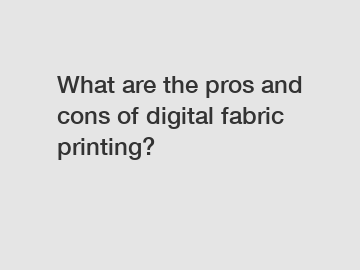Feb. 08, 2024
Textiles & Leather Products
Digital fabric printing has revolutionized the textile industry, enabling designers and manufacturers to create intricate patterns and vibrant colors with ease. However, as with any new technology, it has its advantages and drawbacks. In this article, we will delve into the pros and cons of digital fabric printing, explore the justification behind these points, and analyze the significance and impact of this innovative technique.
Pros of Digital Fabric Printing:
1. Design Freedom and Creativity:

Digital fabric printing eliminates the limitations of traditional printing methods. It allows artists, designers, and entrepreneurs to explore a vast array of intricate designs, patterns, and colors on fabrics. This creates endless possibilities for creativity and enables the production of unique and personalized textiles.
2. Reduced Turnaround Time:
By employing digital fabric printing, manufacturers can significantly reduce the turnaround time for producing fabrics. Traditional methods, such as screen printing, require time-consuming setup and preparations. In contrast, digital printing offers a quick and efficient process, enhancing the production efficiency and meeting the demands of fast-paced fashion and interior industries.
3. Cost-Effective for Small Production Runs:
Digital printing eliminates the need for costly setup and minimum order quantities that are common with traditional printing techniques. This makes it more affordable and accessible for small businesses and independent designers to bring their creations to life. They can produce fabrics in smaller quantities, catering to niche markets and reducing inventory costs.
Cons of Digital Fabric Printing:
1. Limited Color Reproduction:
Though digital fabric printing provides an extensive color gamut, achieving perfect color reproduction can be challenging. Factors such as fabric texture, ink absorption, and color calibration can impact color accuracy. Manufacturers need to carefully select fabrics and conduct test prints to ensure desired color outcomes. Additionally, subtle color gradients may not be as accurately reproduced as in traditional methods.
2. Environmental Impact:
Digital fabric printing utilizes water-based inks, which are generally eco-friendly. However, it requires a significant amount of water during the printing process, leading to higher water consumption compared to traditional printing methods. Moreover, disposing of the digital printers' cartridges and the need for energy-consuming equipment can also contribute to environmental concerns.
Significance and Impact:
Digital fabric printing serves as a catalyst for the industry's transformation by bridging the gap between design and production. It empowers designers to bring their creative ideas to life quickly and cost-effectively. Furthermore, the reduced setup time and flexibility of digital printing enable businesses to tap into niche markets and cater to individual customer demands. With advancements in technology and increased environmental awareness, the limitations and drawbacks of digital fabric printing are continually being addressed, paving the way for further innovation and sustainability in the textile industry.
In conclusion, digital fabric printing offers numerous advantages, such as design freedom, reduced turnaround time, and cost-effectiveness for small production runs. However, it also has drawbacks, including color reproduction limitations and environmental concerns. By understanding and addressing these pros and cons, the textile industry can embrace and adapt to this innovative printing technique, unlocking new possibilities for creativity, efficiency, and sustainability.
Contact us to discuss your requirements of greige fabric manufacturer, wr 108, is cvc cotton good. Our experienced sales team can help you identify the options that best suit your needs.
If you are interested in sending in a Guest Blogger Submission,welcome to write for us!
All Comments ( 0 )